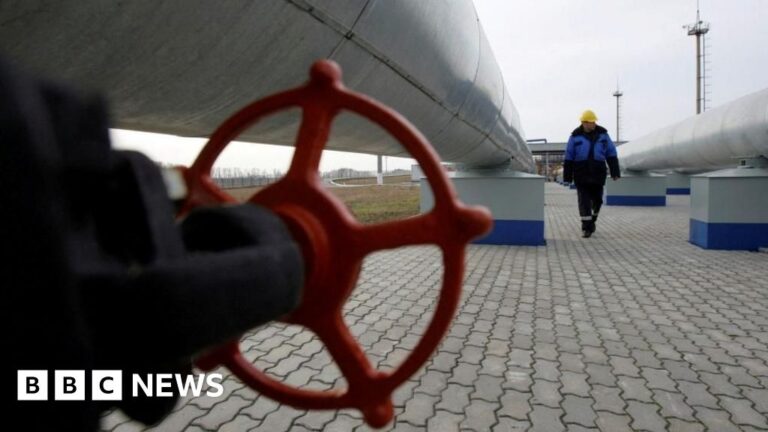Russian gas stopped flowing to EU countries via Ukraine after a five-year deal expired, marking the end of a decades-long arrangement.
Ukrainian President Volodymyr Zelensky said earlier that his country would not allow Russia to “earn extra billions with our blood” and had given the EU a year to prepare.
The European Commission said the continent’s gas system was “resilient and flexible” and could cope with change. However, Slovakia was facing supply deficits and Moldova, which is not part of the EU, is already suffering from shortages.
Russia can still send gas to Hungary, Turkey and Serbia via the TurkStream pipeline across the Black Sea.
Russian company Gazprom confirmed that gas exports to Europe via Ukraine stopped at 8:00 a.m. local time (05:00 GMT) on Wednesday.
Moscow has been transporting gas to Europe via Ukraine since 1991.
Even if the immediate effects are slight, the strategic and symbolic impact for the whole of Europe is enormous.
Russia has lost a major market, but its president, Vladimir Putin, says EU countries will suffer the most.
The EU has significantly reduced its gas imports from Russia since launching its full-scale invasion of Ukraine in 2022, but a number of eastern member states still rely heavily on these supplies , which represents around €5 billion for Russia ($5.2 billion; £4.2 billion). one year.
Russian gas accounted for less than 10% of EU gas imports in 2023, according to the bloc. This figure was 40% in 2021.
But several EU members, including Slovakia and Austria, continued to import significant quantities of gas from Russia.
Austria’s energy regulator said it did not anticipate any disruptions because it had diversified sources and had built up reserves.
But the end of the transit agreement has already caused serious tensions with Slovakia, which is now the main entry point for Russian gas into the EU and collects transit fees for transporting gas to the EU. Austria, Hungary and Italy.
Robert Fico, the Slovak Prime Minister, said on Wednesday that it would have “drastic” consequences for EU countries, but not for Russia, Reuters reported.
On Friday, Fico – who had just made a surprise visit to Moscow for talks with Putin – threatened to stop supplying electricity to Ukraine.
This prompted Zelensky to accuse Fico of helping Putin “finance the war and weaken Ukraine.”
“Fico is dragging Slovakia into Russian attempts to cause more suffering to Ukrainians,” the Ukrainian president said.
Poland has offered to support kyiv in case Slovakia stops exporting electricity, a crucial supply for Ukraine, whose power plants are regularly attacked by Russia.
Polish Foreign Minister Radoslaw Sikorski told BBC Radio 4’s Today program that there were alternative gas supply routes from international markets, such as a terminal in Croatia and connections from there. Germany and Poland.
“These routes need to be explored so that Russia does not make money selling oil and gas to the European Union,” Sikorski said.
Poland imports gas from the United States, Qatar and the North Sea, he added.
“From what I understand, all countries have alternative routes,” he said.
Moldova – which is not part of the EU – could be seriously affected by the end of the transit agreement. It produces a large part of its electricity in a power plant fueled by Russian gas.
It has also supplied supplies to the Russian-backed breakaway region of Transnistria, a small strip of land sandwiched between Moldova and Ukraine, where around 300,000 people live.
Russian gas company Gazprom announced on December 28 that it would restrict gas to Moldova from January 1, saying it had not fulfilled its payment obligations.
Dorin Recean, Moldova’s prime minister, denied the alleged debt and accused Russia of using “energy as a political weapon” in a social media post. He said the move would leave Transnistria “without light and heat in the middle of winter”.
Heating and hot water were cut off to Transnistria “due to the temporary shutdown of gas supplies” at 7:00 a.m. local time (05:00 GMT) on Wednesday, energy company Tirasteploenergo said on Telegram.
He urged residents to dress warmly, bring family members together in one room, hang blankets or thick curtains on windows and use electric heaters.
The temperature was expected to drop below 0°C on Wednesday evening. Medical institutions and hospitals were still supplied, the company said.
Moldovan Energy Minister Constantin Borosan said his government had taken steps to ensure a stable electricity supply, but called on citizens to save energy.
The 60-day state of emergency has been in effect in the energy sector since mid-December.
President Maia Sandu accused the Kremlin of “blackmail” possibly aimed at destabilizing her country ahead of general elections in 2025. The Moldovan government also said it had offered aid to Transnistria.
The EU has found alternative sources of liquefied natural gas (LNG) from Qatar and the United States, as well as gas piped in from Norway, since Russia’s invasion of Ukraine.
In December, the European Commission presented its plan to completely replace gas transiting through Ukraine.

